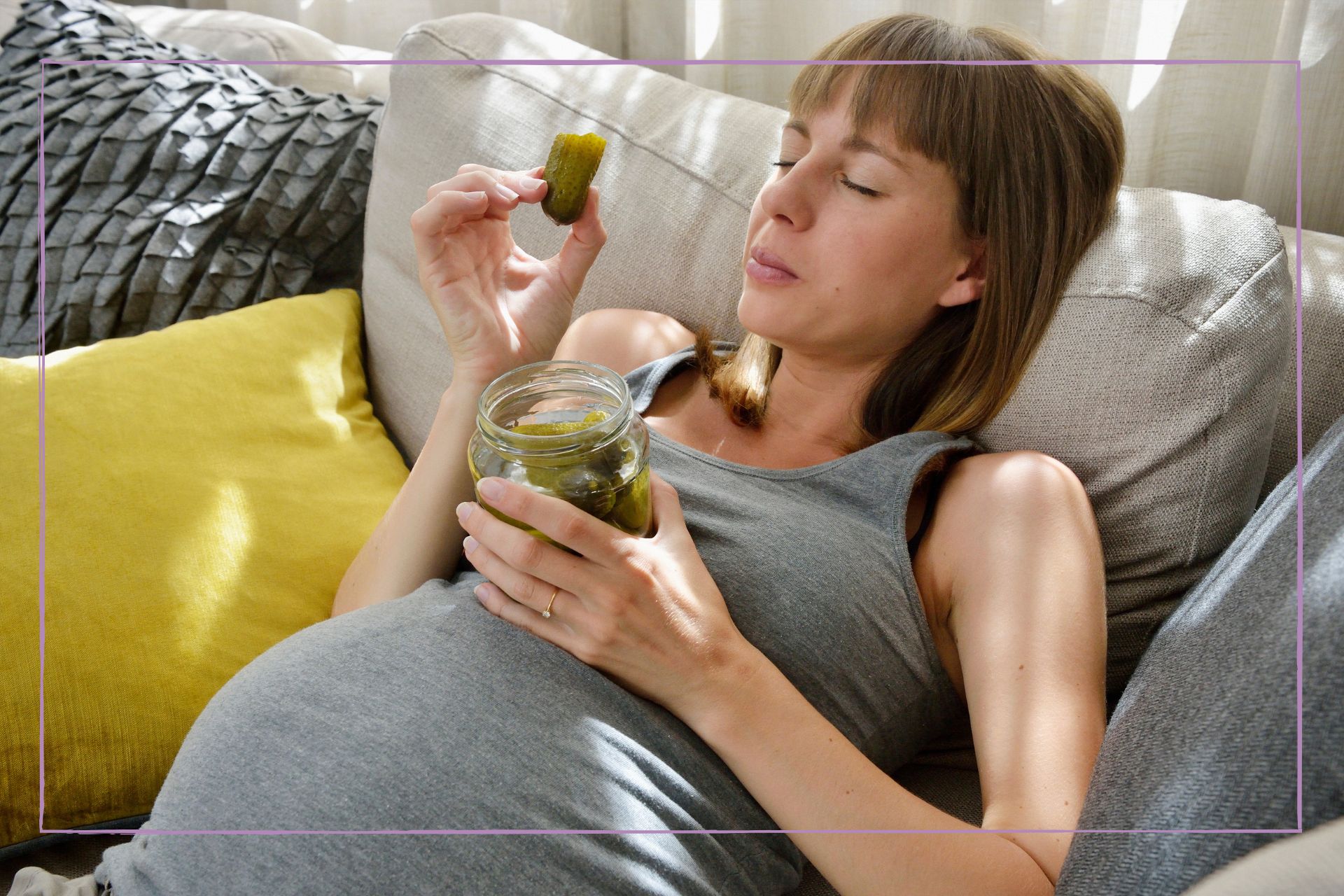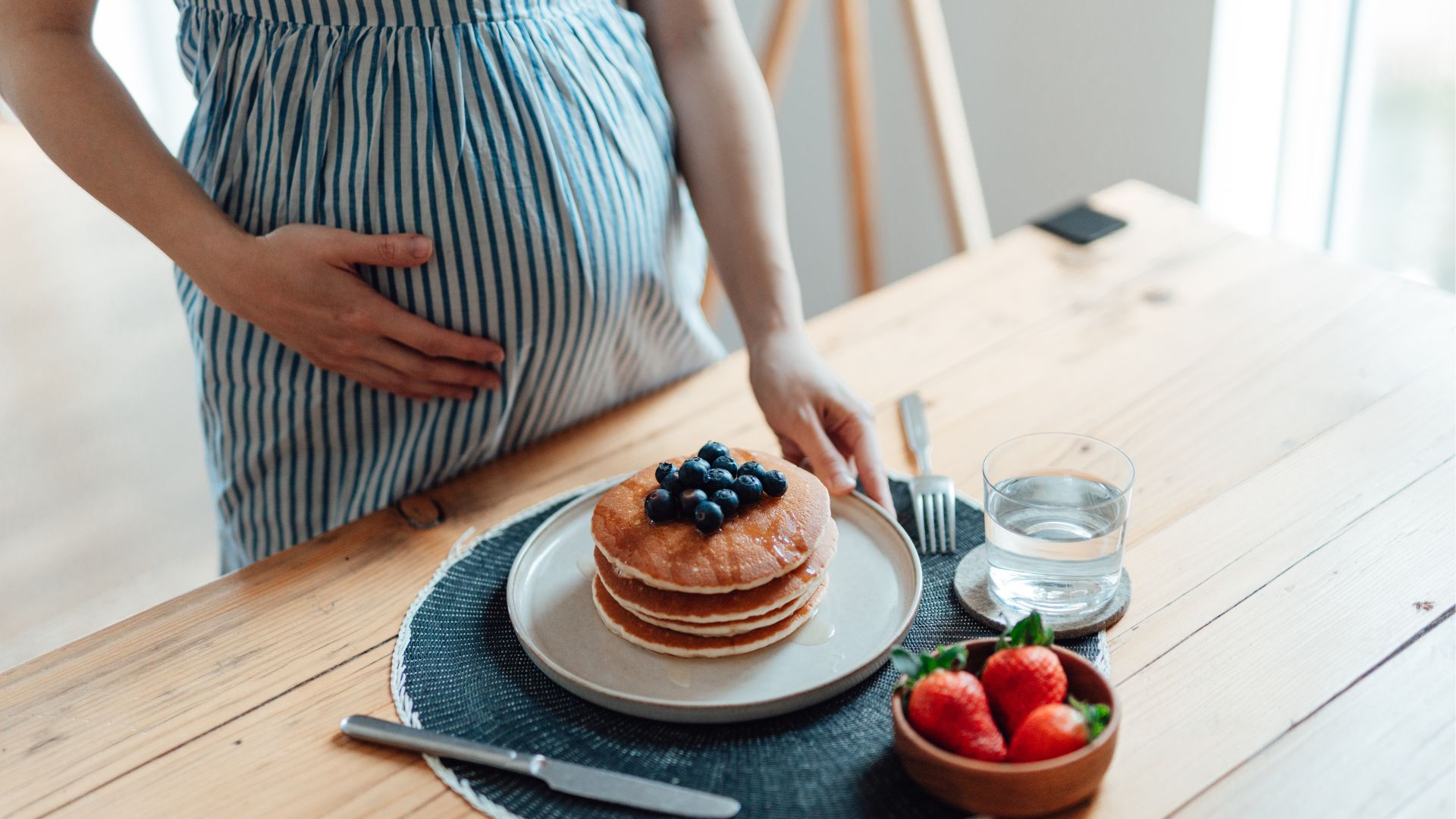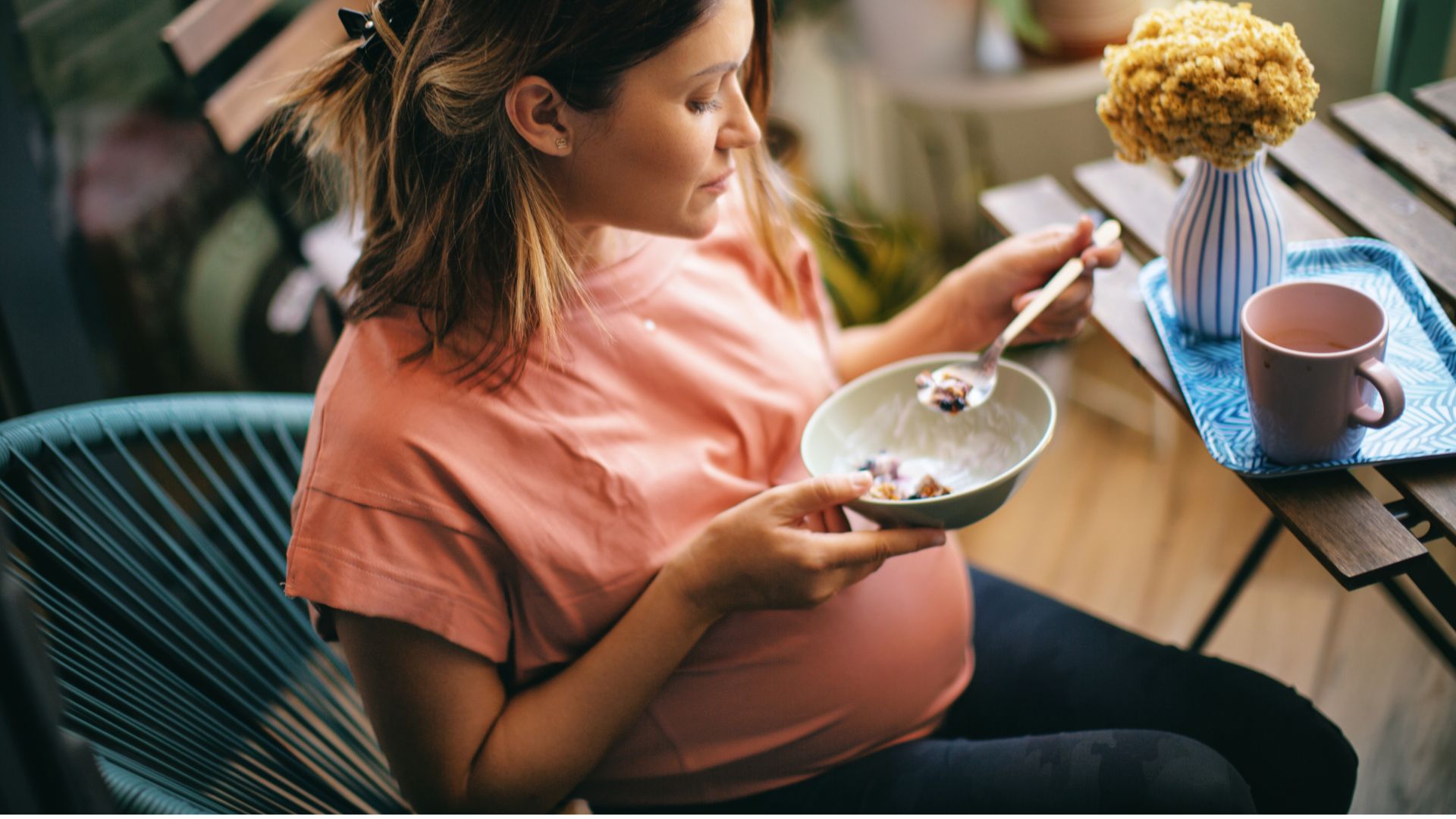Why do I have weird food cravings and what do they mean?
From raw potato to lumps of coal, weird pregnancy cravings and food aversions affect two-thirds of pregnant women. We speak to the experts to find out more

Debra Waters
Pregnancy cravings and food aversions are two typical and well-known side effects of pregnancy. And, they can kick in at any time throughout the 40 weeks of pregnancy - though they usually appear in the first 1-12 weeks.
Weird pregnancy cravings are also one of the many early signs and symptoms of pregnancy, alongside the widely-known morning sickness. And, regardless of whether you're plus size and pregnant or straight sized and pregnant, cravings can be caused by various factors including hormonal changes and a heightened sense of smell and taste. They may even reveal nutritional deficiencies in the person who is pregnant.
Editor's note
All people and pregnancies are different. If you do start having cravings, it could be as early as 5 weeks into pregnancy. They'll get stronger in your second trimester (week 13 - 28), and then eventually stop in your third trimester. Cravings come in all shapes and sizes.
“Cravings tend to differ for each person,” explains consultant obstetrician and gynaecologist at The Portland Hospital, Mr Ellis Downes. “Cravings for ordinary foods like chocolate, fruit, and vegetables can happen. On the flip side, it could be for foods that you might not have liked before you became pregnant.” Mum-of-twins Ashleigh shares her weird food craving with us; "I used to like red apples (it had to be red) sliced up into wedges and then dipped in ketchup."
From salad cream on digestives to boiled eggs with horseradish, we speak to people who were pregnant and experienced weird food cravings firsthand. Plus we grill the experts to find out what happens if you ignore pregnancy cravings, why you might crave certain foods or even non-food items while pregnant, the pregnancy myths around cravings, and whether your craving can be used as a baby gender indicator.
Pregnancy cravings and what they mean
Coal, mud, matches, Guinness or dust
“A craving for coal, mud, matches, Guinness or dust could be a sign of pica,” explains consultant obstetrician and gynaecologist at The Portland Hospital - part of HCA Healthcare UK, Mr Ellis Downes. Pica is a disorder, which sees the persistent eating of substances with no nutrition, such as dirt or paint.
“For these particular items, it could be a deficiency in iron. In some cases, taking iron supplements can help to reduce these cravings,” he says. Check with your doctor before starting any supplements. In Kenya pregnant women eat clay as it's believed to increase fertility and help with reproduction,' she says.
If you crave Guinness, or anything containing alcohol, seek support from your doctor or midwife. Drinking during pregnancy is linked to foetal alcohol syndrome, read more from the NHS. This condition can have a detrimental effect on the development of your baby.
GoodtoKnow Newsletter
Parenting advice, hot topics, best buys and family finance tips delivered straight to your inbox.
We speak to mum-of-two Kirandeep and she shares her 'most bizarre cravings'.
“I had the most bizarre craving during pregnancy: soil. Like, straight from the earth, soil I just wanted to grind it between my teeth. It was so odd, I started offering to dig up my granddad's new potatoes just so I could do it.”
Kirandeep, mum-of-two
Seaweed
Craving seaweed is another sign that you're missing an essential nutrient – in this case iodine. Edible seaweed includes green, red and brown seaweed – and brown seaweed is particularly high in iodine.
“Seaweed contains high levels of iodine, more so than spinach, so if you’re craving this it could indicate that you’re deficient in this mineral,” says Mr Downes. “Iodine is essential for the production of hormones that regulate the development of the foetal brain and nervous system.”
However, it's possible to have too much of a good thing. “During pregnancy intake of iodine should be limited to 220 micrograms daily,” he advises. Seaweed also contains B12. This vitamin is crucial for vegetarians as it's one of the few non-animals sources of this nutrient. 20% of the Daily Value for iron could be obtained from just 4.3 g of dry sea lettuce, 5.1 g of dry rockweed, 9 g of dry wakame, or 13 g of dry nori, according to a study by E Science direct.
Toothpaste and sponges
Some pregnancy cravings are a little strange. For example, many women can't help but eat non-food items such as toothpaste and sponges. “This again may indicate pica,” says Mr Downes. “Resist the temptation to eat non-food items,” he says. “If you're struggling, it can help to consult a doctor or midwife,” he says.
Sometimes, the craving can be caused by your emotional state. A mum-to-be may crave a special food or object that reminds them of their childhood. Talking it through with a health professional should help.
Chocolate
You may think that you crave chocolate because the sugar provides a quick energy boost. You may also feel like you deserve a treat. While you're right on both counts there are other reasons that may explain this yearning. 'Craving chocolate in pregnancy may indicate deficiencies,' says Mr Downes. 'Chocolate contains B vitamins, so it may be that you're low in these vitamins.'
'However, chocolate contains high levels of sugar, so it's important to enjoy these items occasionally and in small amounts,' he adds. 'Try to replace them with other healthy foods such as milk, unsweetened yogurt and almonds.'

Dark chocolate has health benefits as it is also full of antioxidants. Research shows that a lack of antioxidants in your body during pregnancy can cause exaggerated oxidate stress within the placenta and maternal circulation, which could result in pre-eclampsia symptoms and in some more severe cases miscarriage.
“Cultural and psychosocial aspects have an influence too,” says nutrition expert Hayley Pedrick. “Chocolate is consistently found to be the most commonly craved food in the US, while 'If sweet food is your weakness try using more sweet tasting flavourings and spices such as vanilla and cinnamon, which enhance the sweetness of a food,' advises Hayley. If you're worried about calories, studies have shown that women get the same goodness that chocolate provides with flaxseed oil, even though it isn't as delicious.
Strawberries
"Strawberries contain a high level of vitamin C, which can aid your baby’s development," says Mr Downes. "So if you're experiencing cravings for strawberries, you may be lacking in vitamin C,' he says. "Vitamin C also helps you to absorb the necessary amounts of iron from food," adds Mr Downes.
Fruit
This is a super nutritious craving to have during pregnancy as it provides a variety of vitamins and minerals, depending on the particular fruit. For example, you may crave fruit that's high in vitamin C. Prevalent in blackcurrants, cantaloupe melon, citrus fruit, strawberries, vitamin C helps with the proper formation and growth of bones, teeth, and other vital tissues of a foetus.

If you hanker after fruit such as bananas, cantaloupe melon, apricots, nectarines or dried fruit you may be lacking potassium.
Research has found that low potassium levels in pregnancy can lead to weakness, fatigue, muscle cramps, constipation, occasional bouts of muscle weakness in the legs, arms, and eyes, and an abnormal heartbeat.
Be aware that you should always wash fruit before consuming it, and avoid unpasteurized fruit juice during this period. Eating a lot of fruit can cause diarrhea in some people.
“Mine was a crunchy Apple. Sounds really dull as cravings go but I needed a crunchy apple, like nothing else would do. I needed a hard, cold crunchy apple.”
Mum-of-one, Bex
Curry
"Cravings for spicy foods are common," says Hayley. Women's penchant for spicy curries could be because many of us associate is as a comfort food. If your baby is overdue, curry also has a reputation for bringing on labour.
If you've gone off meat or are craving veggies, try vegetable curries like dhal or chickpea curry. Choosing plain rice will be easier on your digestive system. Try our Chickpea dahl recipe or easy vegetable curry recipe.
Ice cream and dairy
Aside from the fact that ice cream is a sweet treat, craving it could be a sign that your body is lacking something. "Craving ice cream in pregnancy may indicate a deficiency. Ice cream contains calcium, so it may be that you are low in this mineral," says Mr Downes.
When the baby is growing inside you it needs high levels of calcium to stay healthy, but some women can't stomach milk and cheese during pregnancy. As a result, ice cream becomes a great way of getting calcium into the body.
During pregnancy, your core body temperature can naturally make you feel hotter than usual, and by the time you go into labour you’ll have gained around 10-12.5kg during your pregnancy, which can make you sweat more than normal. So it's no surprise you crave something cold and refreshing!
“Oranges. Like 100’s of oranges over the 9 months. I was on 15 a day towards the end. I just loved the sour sharp citrus.”
Mum-of-one, Liv
Rice
"Rice is an energy-rich carbohydrate," says Hayley, so it's understandable that some pregnant women will crave it. Rice is also a source of vitamin B6, which helps the body use and store energy from food.
"It's commonly craved in Japan,' she adds, 'highlighting the strong influence of culture on food cravings." If you do crave rice, opt for brown rice which is more nutritious and will provide a steadier stream of energy.
Carrots
Carrots are another vegetable pregnant women may crave – and for understandable reasons.
"They provide good levels of betacarotene, a precursor to vitamin A needed for skin and eye health," says Hayley. "Carrots are also a powerful antioxidant," she adds. Munch on one as a snack or dip carrot sticks into low-fat hummous.
Broccoli
"Broccoli is good for calcium and folate (vitamin B12)," says Hayley, so if you crave it you could be lacking in these.
"Your body requires more folate during pregnancy due to this nutrient's role in fetal development," says Mr Downes. "So, if you're experiencing an increased desire for these vegetables, it may indicate a folate deficiency."
Also known as folic acid, folate can reduce the risk of having a baby with a serious birth defect of the brain and spinal cord, so the pregnant body needs lots of it – so much so pregnant women are advised to take a folic acid tablet every day.
Broccoli is also rich in vitamins A, C, K, B6 and calcium and fibre. Vitamin C helps the body absorb iron, calcium promotes strong bones, and fibre can help prevent constipation during pregnancy.
Red meat
A lot of women have cravings for red meat while they're pregnant. 'It's usually because they need protein and iron,' says Hayley. Red meat has high levels of protein as well as iron, which is important in the formation of red blood cells.
Iron is also a vital component for making haemoglobin, the protein in red blood cells that carries oxygen to other cells. During pregnancy, blood volume increases by almost 50%, so it's even more essential to increase iron stores to ensure oxygen is transported efficiently around the body.
Low iron levels can also lead to iron deficiency. Also known as anaemia, it's a condition that – according to the World Health Organisation – is found in more than half of pregnant women worldwide. Symptoms of anaemia include breathlessness, fatigue, feeling faint, heart palpitations and pale skin.
Pickles
One of the most famous pregnancy cravings is for pickles. It's very normal for pregnant women so don't worry if you're reaching for the gherkins or pickled onions at 3 o'clock in the morning!
"Cravings for salty foods are common and pickles are certainly one such food," says Hayley. "It may reflect low sodium levels." Salt holds water in the body and is really important in keeping the fluids running from mother to baby.
Try not to add too much salt to food; instead, get your salt fix from a snack of pickles or green Spanish olives, or by eating roasted vegetables seasoned with salt and herbs.
“Sour food. So like, any fizzy sour sweets and all the salt and vinegar crisps. I’d eat so many my tongue felt numb, raw.”
Mum-of-one, Carla
Vegetables
If you crave other vegetables during pregnancy, it's most likely due to a vitamin or mineral deficiency.
"For example, vegetables such as dark leafy greens are another good source of iron," says Hayley. Peppers are a great source of vitamins A, B12 (folate) and C and also contain potassium, fibre, folate, and iron, while tomatoes are a good source of vitamins B12 (folate), C and K, as well as potassium and the antioxidant lycopene.
Too much of anything can be detrimental, though. For example, tomatoes are acidic and may cause heartburn in pregnancy if eaten to excess. Don't forget to wash all vegetables thoroughly before eating.
Yoghurt
"Yoghurt contains calcium, so it may be that you're low in this if you're experience cravings," says Mr Downes.
"The craving is thought to be for calcium," adds Hayley. "But studies also show that yoghurt in particular may exert beneficial metabolic and anti-inflammatory effects, possibly in part due to its probiotic qualities," she says.
If you're craving something cool and you're trying to avoid calorific ice cream, try frozen yoghurt. It comes in lots of great flavours and will meet some of your calcium needs without the added calorie count.
Beetroot
This is another vegetable that pregnant women may crave because of its high folate content. Beetroot is rich in B12 (folate), which is essential to the development of a growing foetus. It also contains the minerals magnesium, potassium and phosphorous. And if you're vegetarian or vegan, beetroot is a good source of plant-based iron.
Beetroot helps keep blood pressure in check, boosts immunity, and keeps you regular – welcome news to pregnant women!
Salad
If you're pregnant and can't stop eating salad this is a very healthy craving to have, although remember to wash all vegetables thoroughly before eating. Salad is made from a variety of nutritious items including tomatoes and peppers (see our craving vegetables section, above) and avocado (see below) – all of which provide a range of vitamins and minerals.

Salad is also hydrating. For example, lettuce and cucumber are both made up of around 96% water. So, if you crave salad you may be slightly dehydrated.
It's recommended that we drink between 1.5-2 litres of water a day to stay hydrated. This includes liquids such as tea and fruit juice. Pregnant women should drink slightly more to get all the benefits of drinking water, however. Aim for up to 3 litres a day if it's hot or you've been exercising.
“I’d have salad cream on anything and everything, roast dinners, jacket potato, pasts. My girlfriend couldn’t be in the same room as me when I tried - and liked it - on digestive biscuits. It was just the tang it added. Loved it.”
Mum-of-two, Lou
Avocado
Another great source of B vitamins including B12 (folate) and vitamins C and E , plus magnesium and potassium, avocado is a superfood that's worth eating even if you're not craving it. Nutritious and filling, the healthy fat content also helps to build your baby's brain tissue.
If one of your pregnancy cravings is avocados in the third trimester it could be that your body needs potassium. This mineral known to ease leg cramps, which are common in the later stages of pregnancy.
What will I crave?
Anything and everything. A study by Pregnacare of 1,400 mums found 67% had cravings while they were pregnant, with chocolate, fruit and ice lollies the most common.
Most pregnancy cravings are personal, harmless, and can be a funny story to share with your child one day. Some of the most commonly reported craved foods in the UK are:
- sweets, such as ice cream and Haribo
- dairy, such as cheese
- starchy carbohydrates, such as fries
- fruits
- vegetables
Other cravings reported by individual survey participants included:
- boiled eggs with horseradish
- garlic mushrooms dipped in custard
- grated carrot mixed with ketchup
Parenting consultant Rachel Fitz-Desorgher, mother-of-four with a 30-year-long career as a specialist midwife tells us; “I had a very weird craving. I had to have an ice cold drink AND a boiling hot drink AT THE SAME TIME! I’d take a sip from one and then a sip from the other and so on. I can still feel how good that was even now and cannot understand it.”
She goes on to tell us; “The most noticeable thing about cravings is their urgency and immediacy. You need it that second, and you cannot think straight until the craving is satisfied. Which is why women wake their partners up and ask them to drive out in the early hours to find a chicken tikka masala."
"They can start in the first month of pregnancy when the high levels of HCG produced by the body makes tastes and smells very heightened. They often get stronger in the second trimester before easing a little in the last trimester," Rachel tells us.
What are the most common pregnancy cravings?
The most commonly craved foods are sweets, fruit and fruit juices, sour fruits, dairy, chocolate, starchy carbohydrates, fast foods, pickles and ice cream.
“It’s also fairly common for pregnancy craving to include salty or spicy foods, or hard and chewy foods,” says nutritionist Hayley.
“Cravings for savoury foods tend to be strongest in the first trimester,” adds Hayley. “While a preference for sweeter foods reaches its peak in the second trimester, and urges for salty foods tend to emerge in the third trimester.”
“Not usually a fan of fries, but I could not get enough of them. Not as a meal, as an anytime anywhere snack. The saltiness was divine, plus I was always hungry and potatoes are quite filling!” Mum-of-one, Rita
Then there are the more unusual pregnancy cravings for non-foods. This is called pica. 'Pica may be diagnosed if you compulsively eat non-food items – or items that have no nutritional value – for at least one month,' says Mr Downes. 'It's thought that pica could indicate a nutritional deficiency of some form [often iron]. It's vital that you resist the temptation to eat non-food items to avoid causing harm to the foetus,' he warns.
“Just everything. I didn’t crave one thing, I craved things at the time I needed them. One time I nearly cried because a pub didn’t have a chicken sandwich on the menu! They made one for me from their chicken roast leftovers.”
Mum-of-one, Debs
There are different types of pica: geophagia – the consumption of mud and clay which may be rich in iron; amylophagia – the consumption of starches; and cautopyreiophagia – a craving for burnt matches, cigarettes and cigarette ash. 'The most unusual craving I’ve encountered was an expectant mother who craved ice. I referred her to her GP to check for iron deficiency and she was anaemic, so it was a confirmed case of pica,' says Hayley.
Research indicates that a healthy breakfast such as porridge and herbal tea can cut your cravings, so avoid skipping the first meal of the day. And rather than fighting a food craving 'aim to eat a healthier version of what you fancy 80% of the time – for example, if you crave carbohydrate-rich donuts try swapping them for a wholemeal bagel or breakfast muffin,' says Hayley.
'More than just craving foods you may feel as if you can't eat a lot of the foods you normally would,' says mental health campaigner and TV & radio broadcaster, Neev Spencer. 'Food aversion is a big thing during pregnancy – more so in the first trimester. Dry crackers, bread, and bananas may be the only thing you can stomach, and smells of foods like fish, meat, and eggs are a huge trigger of morning sickness at the start.'
Mum-of-two, Jasmine shares with us a craving for something she'd never wanted before.
“I really wanted red wine. I hate red wine. I thought once I gave birth I’d like it. I even bought a few different bottles in preparation for my new preference. For 9 whole months I would sniff it, waiting for the day I could have a glass. But, I gave birth and now I can’t even smell red wine without feeling nauseous, let alone drink it.”
Jasmine, mum-of-two
When do pregnancy cravings start?
Pregnancy cravings are most likely to occur in the first trimester, weeks 1-12. Rachel tells us; “They can start in the first month of pregnancy when the high levels of HCG produced by the body makes tastes and smells very heightened. They often get stronger in the second trimester before easing a little in the last trimester.”
This coincides with when you may be feeling nauseous or have gone off certain foods. If you do start craving certain foods or non-foods, don't be alarmed.
“As long as you know what you're eating is safe and healthy for you and the baby there's no reason to be concerned,' says Neev. 'It’s important to have knowledge of what could be harmful to your foetus and avoid those foods.
These include seafood that may contain high levels of mercury, uncooked raw fish and meat, high levels of caffeine, and unwashed and properly prepared foods. But sending your partner out into the night to get you ice cream that you can eat with sprinkled chopped-up pickles will always be a safe and bizarre part of the wondrous journey that is pregnancy,' she says.
Even if you don't feel like it, try to eat a variety of foods throughout your pregnancy. This will provide the necessary vitamins and minerals for the optimal development and growth of your baby. Include foods containing iron – such as red meat, oily fish, and eggs – to help prevent anaemia. And fill up on wholemeal bread, lentils, and leafy green vegetables. If you're concerned about your diet, or any cravings, speak to your GP or midwife.
“Frozen peas. I could only take a little pot at the time, otherwise, they’d start to defrost but I loved chomping on frozen peas. Any time day or night.”
Mum-of-twins, Aisha
Can you predict the gender of your baby based on pregnancy cravings?
There is absolutely no link between cravings and gender of the baby. “Pregnancy cravings are about the hormonal changes and those are the same in the mum whatever gender she is having. When women say that they craved one thing for their daughter and another for their son, this is simply the roll of the dice and post-rationalisation,” says Rachel. “I have four boys and had different cravings with each,” she adds.
There are many gender predictor tests that claim to determine the sex of your unborn baby. For example, according to one Chinese belief if you crave sweet foods you're having a boy and if you crave sour foods you're having a girl.
Mr Downes agrees, “there's no evidence to back this up, a baby's gender may be confirmed by a blood test after 10 weeks gestation,” he says. 'Or at the fetal anomaly scan after nineteen weeks of pregnancy.”
Common questions about pregnancy food cravings
What foods should be avoided in pregnancy?
We have a whole article on foods to avoid in pregnancy give it a click to read more information, but the short answer is;
- Raw eggs
- Soft cheeses
- Raw milk
- Shark fish and swordfish
- Alcohol
- Caffeine
- Unwashed fruit or salad
Should you ignore pregnancy cravings?
Ignoring pregnancy cravings is generally safe, especially if they are for energy-dense, nutrient-low foods, such as desserts or snack products. According to a study by Frontiers in Psychology pregnant people crave certain foods because of nutrient deficiencies. Additionally, the same study found that pregnancy cravings could be a result of the hormonal imbalances that inevitably occur during pregnancy.
When deciding whether or not to ignore a weird food craving, consider the type of food concerned. Pause and reflect on these points;
- Are your cravings taking over your balanced meals?
- Do they lead you to eat more than you are hungry for?
- Do the cravings consistently make you choose foods that are highly transformed?
What do pregnancy cravings feel like?
Pregnancy cravings are an intense compulsion to eat certain foods, usually triggered by hormonal changes. Pregnancy cravings create what feels like a nearly irresistible urge to eat particular foods. The cravings themselves can range from fruit and vegetables to seemingly bizarre junk food combinations, according to a study at UPMC.
How do I fight my pregnancy cravings?
If eating unhealthy food is turning into a habit and you have a hunch that it’s starting to wreak havoc on your health, try:
- Contextual strategies. Remove craved foods from the environment, and yourself from an environment where you may encounter the foods you crave.
- Behavioral strategies. Eat frequently to avoid hunger, drinking more water, substituting craved food with a healthier choice, or consuming a small portion of, the craved food can work well.
- Psychological strategies. Psychological strategies mostly involve keeping yourself busy, but you can focus on specific thoughts, too. Keeping busy can distract you from food cravings, or you can consider how indulging in the craved food might impact your health or your baby’s.
You can always talk to your doctor or midwife if you have any concerns about pregnancy cravings, especially if you’re concerned about weight gain.
Weirdest food combos
Social platform TikTok's #pregnancycraving went viral, with pregnant people across revealing their weirdest food combinations. From bananas with ketchup, to curry at breakfast time here's what the weirdest food combinations looked like;
- Bananas and ketchup
- Mayonnaise and tomatoes
- Cheese and honey
- Tuna and ice cream
- Nutella and mayo
- Onion and chocolate
- Pretzels and ice cream
- Vinegar
- Curry (at all times of the day!)
We spoke to the following experts

I am both a Private Obstetrician and a Private Gynaecologist with a keen interest in endoscopic surgery (key hole) and urogynaecology (bladder problems).

Hayley is a lifestyle medicine expert and executive coach with 12 years of clinical experience. She uses functional testing to provide clear-cut, personalised nutrition programmes that get results. Hayley has an established reputation for restoring healthy function in her clients, particularly when their issues are chronic and complex.

Internationally-known baby and parenting expert, author of your baby skin-to-skin, former midwife and mum-of-four.

TV and radio broadcaster, Mental health campaigner and expert panellist on BBC 5 Live’s ‘Mental Health Mum Takeover’. She subsequently hosted the Maternal Mental Health Awards and made a film about her own experience of post-natal depression for the Royal Foundation’s movement Heads Together.
We have so many helpful articles on birth, such as our stages of labour according to a midwife and the different types of contractions pregnancy to expect, and even lots of suggestions on baby names; from our most popular baby names to gender neutral baby names - take a scroll.
Anna Bailey has been the editor of GoodtoKnow since 2018. Before joining the team she was Features Editor at MSN UK, where she oversaw Family Health and Days Out. Previously, she was Digital Lifestyle Editor for the broadcaster UKTV, and Lifestyle Editor for ITV.com. Anna studied Multi-Media Journalism at Bournemouth University and went on to gain her NCTJ and NCE journalism qualifications. Anna is responsible for driving the direction and editorial strategy of Goodto. A mum and experienced baby product tester, she is passionate about providing safe, trustworthy, and relatable advice for families of all kinds.
- Debra WatersFreelance Lifestyle Writer